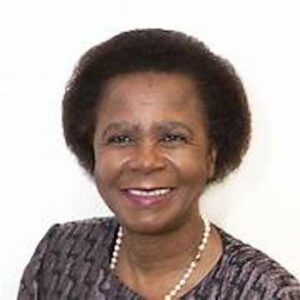
Mamphela Ramphele
*Mamphela Ramphele was born on this date in 1947. She is a Black South African activist, doctor, academic, and businesswoman.
Mamphela Aletta Ramphele was born in the Bochum District in Northern Transvaal (now Limpopo, South Africa. Her mother, Rangoato Rahab, and her father, Pitsi Eliphaz Ramphele, were primary school teachers. In 1955, Ramphele witnessed a conflict between a racist Afrikaner church minister and the people of the village of Transport. This episode contributed to her political awakening. Ramphele attended the G. H. Frantz Secondary School in January 1962, but she left for Bethesda Normal School. In 1964, she moved to Setotolwane High School for matriculation, where she was one of only two girls. Upon completing her schooling in 1967, Ramphele enrolled in pre-medical courses at the University of the North.
In 1968, she entered the University of Natal Medical School. For the rest of her years at medical school, Ramphele won the 1968 South African Jewish Women's Association Scholarship and the Sir Ernest Oppenheimer Bursary, worth about R150 annually. Ramphele received her Bachelor of Medicine and Bachelor of Surgery (MBChB) from the University of Natal, a BC in Administration from the University of South Africa, and diplomas in tropical health and hygiene and Public Health from the University of the Witwatersrand.
While at university, Ramphele became increasingly involved in student politics and anti-apartheid activism, becoming one of the founders of the Black Consciousness Movement (BCM), where she met Steve Biko, with whom she had a relationship. Biko and Ramphele had two children: Lerato Biko, born in 1974, and Hlumelo Biko, born in 1978. Lerato died of pneumonia when she was two months old. Hlumelo Biko was born after Biko's death. Ramphele and her son eventually worked for their family investments in the Circle Group holding company.
From 1970, Ramphele became increasingly drawn into political activism with Biko, Barney Pityana, and others. Ramphele worked with the South African Students' Organization (SASO), which operated on English-speaking white campuses. Ramphele received her qualification in medicine in 1972. She began her medical internship at Durban's King Edward VIII Hospital, later transferring to Livingstone Hospital in Port Elizabeth. 1974, Ramphele was charged under the Suppression of Communism Act for banning literature. In 1975, she founded the Zanempilo Community Health Care Centre. It was one of the first primary healthcare initiatives outside the public sector in South Africa.
She became the Eastern Cape's Black Community Programs (BCP) director when Biko was banned. In August 1976, Ramphele was detained under Section 10 of the Terrorism Act. In April 1977, Ramphele was issued with banning orders and banished to Tzaneen, Northern Transvaal, where she remained until 1984. A local church member arranged for her to live with two African nuns in a local village, Tickeyline. She later established a home in Lenyenye township near Tzaneen, although she remained under police surveillance. Stephen Biko was arrested and killed in police custody during this time.
While in Tzaneen, Ramphele established the Isutheng Community Health Program with monetary aid from the BCP to empower local women and aid them in growing vegetable gardens, amongst other initiatives. While in Tzaneen, Ramphele had occasional illicit outings to escape everyday life and visits from Helen Suzman, MP of the Progressive Party. Suzman assisted Ramphele in securing a passport when Ramphele traveled abroad. 1983, she completed her BCom degree at the University of South Africa. She also completed a Postgraduate Diploma in Tropical Hygiene and Public Health at the University of Witwatersrand. This required that Ramphele apply for a special dispensation to travel to Johannesburg, where she had to report at the John Vorster Square Police Station upon her arrival and departure.
Ramphele left Lenyenye in 1984 for Port Elizabeth to work as a research fellow at the South African Development Research Unit (SALDRU). Ramphele joined the University of Cape Town as a research fellow in 1986 and as one of its deputy vice-chancellors in 1991. 1991, she received her Ph.D. in Social Anthropology from the University of Cape Town. Ramphele has also authored and edited several books. She was appointed to the post of vice-chancellor of the university in September 1996, becoming the first Black woman to hold such a position at a South African university. In 1994, Ramphele was a visiting scholar at Harvard University's Kennedy School of Government in Cambridge, Massachusetts.
In 2000, Ramphele became one of the four managing directors of the World Bank. She was the first South African to hold this position. Ramphele was a trustee of the Nelson Mandela Foundation and director of The Institute for Democratic Alternatives in South Africa. Ramphele was also a trustee for The Link SA charitable fund. She was on the board of the Mo Ibrahim Foundation. She was voted 55th in the Top 100 Great South Africans in 2004. In 2013, Ramphele resigned as the chairperson of Gold Fields. On February 13, 2013, she announced the formation of a new political party, Agang South Africa, intended to challenge the African National Congress.
Some critics have challenged her drawing on Steve Biko's legacy in her political campaigns. In January 2014, Ramphele issued a statement saying that she would not take up Democratic Alliance party membership and would remain the leader of Agang South Africa, which was confusing. On February 2, 2014, Helen Zille stated that Ramphele had reneged on her agreement to stand as the Democratic Alliance's presidential candidate.
Ramphele apologized for reversing her decision, saying that the timing was incorrect as the reaction to it had shown people were unable to overcome race-based party politics. Agang South Africa won two seats in the National Assembly of South Africa. Following internal conflict within the party, Ramphele announced her withdrawal from politics on July 8, 2014. Since 2018, she has been the co-president of the Club of Rome.